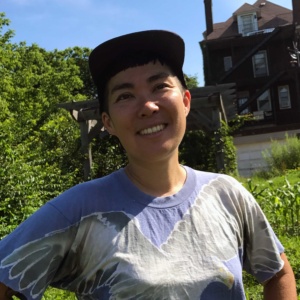 Ginger Brooks Takahashi wears many hats: artist, forager, community organizer and assistant at two of our grow sites, Shiloh Farm and The Frick Pittsburgh’s greenhouse. Shiloh Farm has expanded tremendously this year, adding two beehives and a flock of Rhode Island Red hens. The farm is a neighborhood attraction, with visitors coming to admire the chickens or chat from the sidewalk.
Ginger Brooks Takahashi wears many hats: artist, forager, community organizer and assistant at two of our grow sites, Shiloh Farm and The Frick Pittsburgh’s greenhouse. Shiloh Farm has expanded tremendously this year, adding two beehives and a flock of Rhode Island Red hens. The farm is a neighborhood attraction, with visitors coming to admire the chickens or chat from the sidewalk.
“I think of working outdoors is a way of performing: you interact with people, people talk with you. This has been a rewarding way to connect with people that I live around,” says Takahashi. She’s honed those skills this year as Shiloh hosted three volunteer groups and seven farm tours. She consciously endeavors to be “out” and visible as a queer biracial person in her work life, encouraging the farm apprentices to challenge their preconceptions about the Asian or LGBTQ people in their lives.
2017 was Takahashi’s first season with us, but she has been growing gardens and networks in her Braddock community for years. She stands in a whimsical tangle of a healing garden next to a brightly colored Braddock building that will house General Sisters, a dream seven years in the making with partner Dana Bishop-Root. “The goal is to open a general store here, providing ingredients for making food to our neighbors,” says Takahashi as she slips through the garden, introducing medicinal plants as one might introduce dear friends.Takahashi and Bishop-Root have been collaborating with the neighbors, organizing with them on causes that matter to their families, sharing culture through shared meals, and learning what they want out of a store on their street that they cannot buy at other nearby corner stores. “It’s beautiful in that it forms a kind of ecology: we only have to carry the things we’re invested in, which are raw ingredients the other stores don’t carry,” says Takahashi.
A few streets over, Takahashi and Leslie Stem are collaborating with their neighbors in the form of the neat, orderly rows of a vegetable garden. Stem secured use of the land from the Mon Valley Initiative and eventually purchased it to keep it as a growing space. “We’re both people who are careful about land ownership as a way of understanding one’s right to use a land,” says Takahashi.
While the plot has a lot of diversity, her time growing at the Frick greenhouse and Shiloh Farm have influenced how she makes use of the two growing spaces. “Doing a farm job has changed my relationship to gardening in these projects. In addition to growing new things and learning more about soil biology, there are some things I don’t have to grow because I know that there are plenty of greens, plenty of zucchini,” she says.
No matter the setting, Takahashi cherishes her relationship with plants and people. “My joy comes from sharing labor and the experiential learning produced by working together,” she says.
